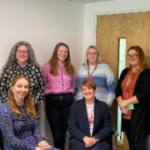Not just a report, the Engineering and Physical Sciences Research Council (EPSRC) EDI & People team are putting the action into their equality, diversity and inclusion (EDI) action plan. Here’s an update of the latest activities and initiatives we’re putting in place to reduce inequities and create a more inclusive research culture and environment – making everyone feel welcome and included in engineering, mathematical and physical sciences.
It’s called an action plan for good reason. When we published the EPSRC EDI action plan last December, it was the result of a huge amount of work. It brought together knowledge, research, data and expertise, and was informed by extensive engagement and conversation with people from across our EPSRC community and beyond. But far from being the culmination of our work, the EDI action plan marked the start of our next stage – and now we’re well and truly onto the action part.
The EDI & People team are busy progressing activities outlined in the action plan. In this blog, we want to tell you about the ways in which we are harnessing our resources, investments and community expertise to create and embed a more inclusive engineering and physical sciences system for everyone.
However, it’s not just about us; it’s about you, too. The journey to a more inclusive research system is a shared one. That’s why we are working on initiatives to encourage partnership and participation with our community and stakeholders, including our new initiative the EDI Sharing Hub, due to launch in September 2023.
Read on, to find out what we’re up to…
Working in partnership
For a truly inclusive research culture, we need your help to enact day-to-day change in your own teams, labs and workplaces. In 2022, we commissioned a report to gather and demonstrate the contribution that our investment in the Inclusion Matters portfolio has made to increasing diversity and tackling inclusion challenges in our research and innovation landscape. The resulting Inclusion Matters report offers a hugely valuable resource, with many outputs and outcomes that you can use in your local environment.
We have also published our EDI expectations guide and supporting resources. Co-developed with EDI champions from across EPSRC’s strategic advisory teams, Council, PRISMs (Professional Research Investment and Strategy Managers) and members of our community, these tools encourage everyone in our community to be involved in enhancing and embedding EDI good practices.
There’s also great excitement here in the EDI & People team about our EPSRC EDI sharing hub (Action 3.7). This will develop an overarching network for collective knowledge sharing of EDI good practices and ‘what works’ across our disciplines.
With this funding opportunity, we aim to bring together a diverse range of people with different expertise, experiences, perspectives, approaches and ways of thinking. We envisage this may include grant holders and participants from discipline specific Network Pluses, programme grant holders, research centres and hubs, EDI experts including people from the Inclusion Matters teams, EPSRC EDI fellowship holders, EDI champions across research areas and many others.
Importantly, the EDI sharing hub will have funding to help consider how interventions might be scaled up, embedded and broadened across the community. Our aim is to empower our communities to share good practice and initiate new activities that contribute to embedding EDI across our research and innovation community.
Creating inclusive practices
We are undertaking a variety of activities that improve EPSRC processes and, importantly, trust and confidence in the way we work. By addressing the time scales, processes used and potential barriers to entry, our aim is to make it simpler and more flexible to apply for funding.
We are working with UK Research and Innovation (UKRI) colleagues to understand the role of university selection processes on our portfolio (Action 2.10). As a first step, we will be launching a small survey for university partners to gather approaches and issues, then we plan to continue the conversation in more depth with a series of regional roundtables later in the year. We are looking forward to hearing from our university partners on good practice in their selection processes and how they support people to apply for our grants. Our longer-term aim is to develop guidance for our community on good inclusive practices for fair selection.
We are also planning discussions with universities about workload models to make sure everyone with research roles has time to engage in research alongside other university work (Action 2.11).
We are always investigating ways to improve the way we work, in particular, how we can further reduce unintended bias in our decision making. We have been looking at how our panel processes and roles could further strengthen the operation and transparency of our peer review panels and improve trust and confidence in the assessment and selection process. We are developing the role of panel process observers to strengthen fair and objective decision making. These roles will be performed by members of our community and we will be providing more communication on this later in the year, along with opportunities to get involved (Action 2.4).
Similarly, we are launching a new policy where we aim for at least one early career researcher to be included as a panel member on all prioritisation panels (Action 2.13). This benefits the career development of early career researchers, helping them to network and gain a more in-depth understanding of how the funding system operates and how assessment decisions are made. It also brings new voices into our assessment of research.
The teams in EPSRC work hard to bring a diverse range of opinions and perspectives into our decision making within peer review. For the seventh consecutive year we have exceeded our target of 30% for the underrepresented gender (women) on all panels held in the year. In 2022 to 2023 the proportion of women panel members was 32.5%. Even better, the percentage of women panel chairs is up by 6% from the previous year to 40.5%. Our target of at least 30 % women on panels is set to be challenging and above the proportion of women holding our grants, but there is still a long way to go to reach 50% participation by women in line with the general population.
Looking through a lens of ethnicity, 13.7% of panel members identified themselves as an ethnic minority, 75.2% of panel members identified as White with 11.1% not disclosing their ethnic status. For comparison, the proportion of our academic community identifying as ethnic minority is 21%, 73 % identify as White and 6 % unknown (Higher Education Statistics Agency data 2018 to 2019). We want to thank everyone in our community who contributes to peer review.
We have been listening to your ideas to continue making progress. To make our funding opportunities more inclusive, we have worked with colleagues across UKRI and the new UKRI Funding Service and will be piloting a flexible leadership model that allows for one or more project leads to lead grant applications and be recognised. This enables different people to bring a diversity of knowledge, skills and experience to the leadership team. Allowing more than one project lead also enables the leadership of the funding opportunity to be performed on a job share basis. We will be starting this new model with our EDI sharing hub.
Embedding inclusivity into our communities
What are the barriers to access and participation in our communities? We’re investigating what we can do to better support people in their working environments and create a culture where different perspectives, skills and experiences are valued.
These barriers can be encountered when accessing facilities, such as our national research infrastructures, where we’re working with the EPSRC Research Infrastructure team to improve accessibility to our large-scale facilities (Action 5.2). The plan is to share good practice with smaller scale spaces, such as academic research labs and similar environments, so we can promote greater accessibility and participation throughout engineering, mathematical and physical sciences.
We’re addressing unseen barriers, too. We are collaborating with the EPSRC Mathematical Sciences team to explore how we can improve support and access for people who are neurodivergent (Action 5.3). We’ve commissioned a neuro-inclusion audit of our own processes and routes to engagement to understand and mitigate against any barriers and improve accessibility for everyone. We plan to share the recommendations from this audit, so you might implement in your own environments.
Get in touch
The EPSRC EDI action plan is very much a living document. Everyone in the community can help. We want to hear from you about your insights, experiences and perspectives so we can continue to shape its development. So, please do get in touch with us at inclusionmatters@epsrc.ukri.org
To find out more about action plans in other councils and the UKRI EDI strategy, visit equality, diversity and inclusion (EDI).



